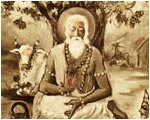 When Akbar was the Emperor of Delhi there lived a hermit in a hut in the forest. Many people visited the holy man. At one time he felt a great desire to entertain his visitors. But how could he do so without money? So he decided to go to the Emperor for help, for the gate of Akbar’s palace was always open to holy men.
When Akbar was the Emperor of Delhi there lived a hermit in a hut in the forest. Many people visited the holy man. At one time he felt a great desire to entertain his visitors. But how could he do so without money? So he decided to go to the Emperor for help, for the gate of Akbar’s palace was always open to holy men.
The hermit entered the palace while the Emperor was at his daily devotions and took a seat in a corner of the room. He heard the Emperor conclude his worship with the prayer, “O God, give me money; give me riches”, and so on and so forth. When the hermit heard this, he was about to leave the prayer hall, but the Emperor signed to him to wait.
When the prayer was over the Emperor said to him, “You came to see me: how is it that you were about to leave without saying anything to me?”
“Your Majesty need not trouble yourself about it.”, answered the hermit. “I must leave now.” When the Emperor insisted, the hermit said: “Many people visit my hut, and so I came here to ask you for some money.”
“Then”, said Akbar, “Why were you going away without speaking to me?”
The hermit replied: “I found that you too were a beggar; you too prayed to God for money and riches. There upon I said to myself: ‘Why should I beg of a beggar? If I must beg, let me beg of God.”
Srila Prabhupada explains: Ashaya means “determination.” Generally a conditioned soul has the determination for material profit, but when these desires for material profit are satisfied through performance of yajna, one gradually achieves the spiritual platform. Then his life becomes perfect. Srimad-Bhagavatam (2.3.10) therefore recommends:
akamah sarva-kamo va
moksa-kama udara-dhih
tivrena bhakti-yogena
yajeta purusam param
If a person wants to return home, back to Godhead, or wants to become a pure devotee (akama), or wants some material prosperity (sakama or sarva-kama), or wants to merge into the existence of the Supreme Brahman effulgence (moksa-kama), he is recommended to take to the path of devotional service and hear and chant of Lord Vishnu or of His devotee. This is the sum and substance of all Vedic literatures.